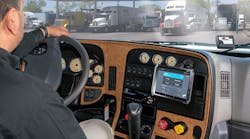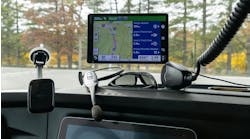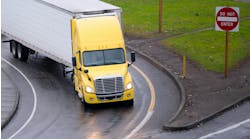The Federal Motor Carrier Safety Administration (FMCSA) just announced the denials of 10 electronic logging device (ELD) exemption requests from 10 trade organizations and associations. The announcements were made in the Federal Register published Friday, Dec. 7.
Most of these decisions were made in June and another one in July but the government was required to publicly announce the denials this month.
The applicants were Power and Construction Contractors Association; Western Equipment Dealers Association; Association of Energy Service Companies; Cudd Energy Services, Inc.; SikhsPAC and North American Punjabi Trucker Association; Owner-Operator Independent Drivers Association, Inc.; American Disposal Service; Towing and Recovery Association of America; National Electrical Contractors Association; and the Agricultural Retailers Association.
The FMCSA said it reviewed each application and any comments received and rendered each decision — all denials — based upon the merits of the application.
The current hours of service (HOS) regulations require most motor carriers to ensure their drivers use ELDs in place of written logs to record their duty status each day. There are some ELD exceptions for short-haul operations within a 100 air-mile radius and agricultural operations within a 150 air-mile radius.
Here are details on each of the 10 denied requests, as published by the government on Friday:
Power and Construction Contractors Association
The PCCA requested that motor carriers and drivers operating commercial motor vehicles in the power and communication construction industry be allowed to use paper records of duty status (RODS) instead of ELDs. PCCA noted that construction contractors spend considerable time off-road on varying job sites; a single CMV may have several different drivers over the course of a day, moving the vehicle short distances around the job site. Due to the limited time that their drivers spend driving on public roads within a workday, PCCA stated that the ELD and RODS requirements for drivers in its industries do not result in a significant safety benefit.
FMCSA reviewed the application and the 259 public comments submitted. FMCSA denied PCCA's application for exemption because the agency said it could not ensure that the exemption would provide the requisite level of safety.
Western Equipment Dealers Association
WEDA requested this exemption from ELD use on behalf of several organizations and their members. Effectively, the requested exemption would eliminate the requirement for agricultural equipment dealers to install ELDs on their CMVs. WEDA stated that equipment dealer operations in agriculture present unique circumstances that warrant the requested exemption and that the failure to grant it would pose an undue burden on equipment dealers and their customers without a measurable safety benefit.
FMCSA reviewed the application and the 125 public comments submitted. FMCSA denied WEDA's application for exemption because the agency said it could not ensure that the exemption would provide the requisite level of safety.
Association of Energy Service Companies
AESC requested ELD-exemption to allow all drivers of well service rigs to complete paper RODS instead of using an ELD whenever the drivers exceeded the requirements of the short-haul exception. According to AESC, complying with the ELD requirement would be overly burdensome for well service rig contractors without providing any measurable safety benefit. AESC further argued that well service rig drivers spend very little time on public roads, in contrast to long-haul truck drivers who spend most of their on-duty hours driving on public roads.
FMCSA reviewed the application and the 8 public comments submitted. FMCSA denied AESC's application for exemption because it could not ensure that the exemption would provide the requisite level of safety.
Cudd Energy Services, Inc.
CES requested an ELD exemption for its specially trained drivers of specially constructed CMVs used in oilfield operations to allow drivers of these infrequently driven trucks to complete paper RODS instead of using an ELD. FMCSA regulations prohibit these drivers from using the short-haul exceptions to the HOS rules. CES argued that the exemption would not have any adverse impacts on operational safety because drivers would remain subject to the HOS regulations as well as the requirements to maintain paper RODS.
FMCSA reviewed the application and the 8 comments submitted. None of the comments supported the exemption. FMCSA denied AESC's application for exemption because the agency could not ensure that the exemption would provide the requisite level of safety.
SikhsPAC and North American Punjabi Trucker Association
These applicants requested an exemption from the ELD requirements on behalf of their members (fresh produce shippers and small truck businesses). According to the Sikhs PAC and NAPTA, many of their members were not fully prepared to meet the Dec. 18, 2017, compliance date. The exemption would allow members involved in segments of America's agricultural transportation industry to delay using ELDs for one year. The applicants asserted that the exemption, if granted, would give the marketplace time necessary to develop cost-effective and practical solutions for the specific needs of impacted stakeholders and would allow FMCSA time to address training programs with compliant ELD options.
FMCSA reviewed the application and the 41 comments submitted. FMCSA denied the application because the information provided by the applicants failed to distinguish the drivers who would be included under the exemption. “The applicants failed to indicate how they could ensure that the exemption would achieve a level of safety equivalent to, or greater than, the level of safety that would be obtained by compliance with the HOS regulation,” the government wrote.
Owner-Operator Independent Drivers Association, Inc.
OOIDA requested a five-year exemption from the ELD rule for certain motor carriers considered to be a small transportation trucking business. If granted, the exemption would cover small trucking businesses that do not have a carrier safety rating of “unsatisfactory,” and that can document a proven history of safety performance with no attributable at-fault crashes.
FMCSA reviewed the application and more than 4,000 comments submitted. An estimated 96 percent of the comments were from owner-operators in favor of the exemption. The rest were in opposition to the proposed exemption. FMCSA denied the application, noting that most of the content of the application challenges the basis of the ELD rule itself, rather than justifying an exemption for a specific segment of drivers under applicable statutory standards.
FMCSA also noted that the application provided no consideration of the significant difficulty that would be encountered in trying to identify and validate drivers who meet the proposed exemption criteria, especially during roadside inspections.
American Disposal Service
ADS is a trash hauling and recycling company operating in four states (Virginia, Maryland, Georgia and Colorado), with more than 300 drivers who hold CDLs. ADS has been using the multiple stop rule, “treating all the stops in a village, town or city as one.” ADS operations fall under the 100 air-mile short haul exemption. When drivers exceed the 12-hour limitation more than 8 times in any 30 consecutive days, ADS is required to install and use ELDs in its CMVs.
ADS applied for the exemption from the ELD and paper RODS requirements because the company does not believe ELDs can accurately record driving time when the CMV makes constant short movements with the driver often exiting the vehicle. FMCSA reviewed the application and the 10 comments submitted. FMCSA denied the application after concluding that ADS had not clearly explained how its non-use of ELDs and its discontinued use of paper RODS would reach the current level of safety that compliance with the HOS rules provides.
Towing and Recovery Association of America
TRAA is the national towing association representing more than 35,000 towing companies in all 50 states. TRAA has requested a five-year exemption for all operators of CMVs owned or leased to providers of motor-vehicle towing, recovery, and roadside repair services while providing such services. TRAA stated that towing industry operations represent a unique and vital segment of the overall transportation industry in America that warrants an exemption from the ELD regulations. TRAA said that failure to grant the exemption will cause confusion and create an overly complex regulatory framework that will pose an undue burden on towers and their customers without any measurable benefit to public safety.
FMCSA reviewed the application and the 250 comments submitted. FMCSA denied the application after concluding that TRAA's plan for the continued use of paper RODS and the process for reviewing the RODS to verify accuracy would be comparable to the level of safety provided by paper RODS prior to the implementation of the ELD rule but would not achieve the equivalent level of safety that would be achieved by the use of ELDs.
National Electrical Contractors Association
NECA requested an exemption from the requirement to use an ELD on CMVs used by 4,000 contractor members who install, repair, and maintain the infrastructure of electrical utilities. NECA believes the ELD requirement burdens its members' operations unnecessarily. It proposed to continue to use paper logs to record their HOS.
FMCSA reviewed the application and the 275 comments submitted. Many of the comments were form letters in support of the application. FMCSA denied the application because it was unable to determine from the application and the public comments whether operations under the requested exemption would provide a requisite level of safety.
Agricultural Retailers Association
ARA applied for exemption from the ELD requirement on behalf of its members who are retailers and distributors of farm-related products and services. ARA members rely on CMVs to deliver their products and services to farms. ARA asserted that its members were not prepared to meet the December 18, 2017 deadline for complying with the ELD rule and sought to obtain a postponement of the deadline.
FMCSA reviewed the application and the 117 comments submitted. FMCSA denied the application because it was unable to determine from the application and the public comments whether operations under the requested exemption would provide a requisite level of safety.




